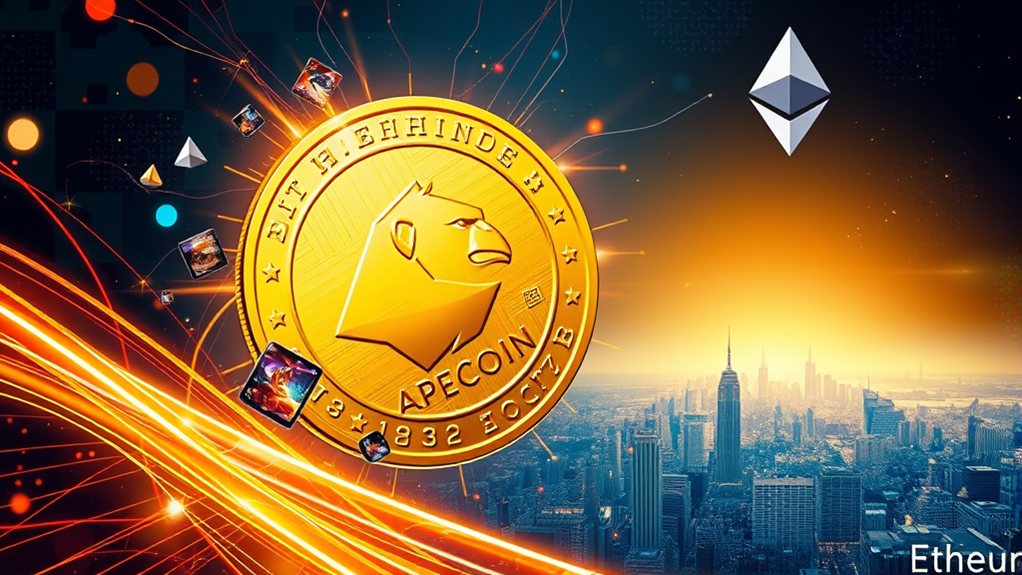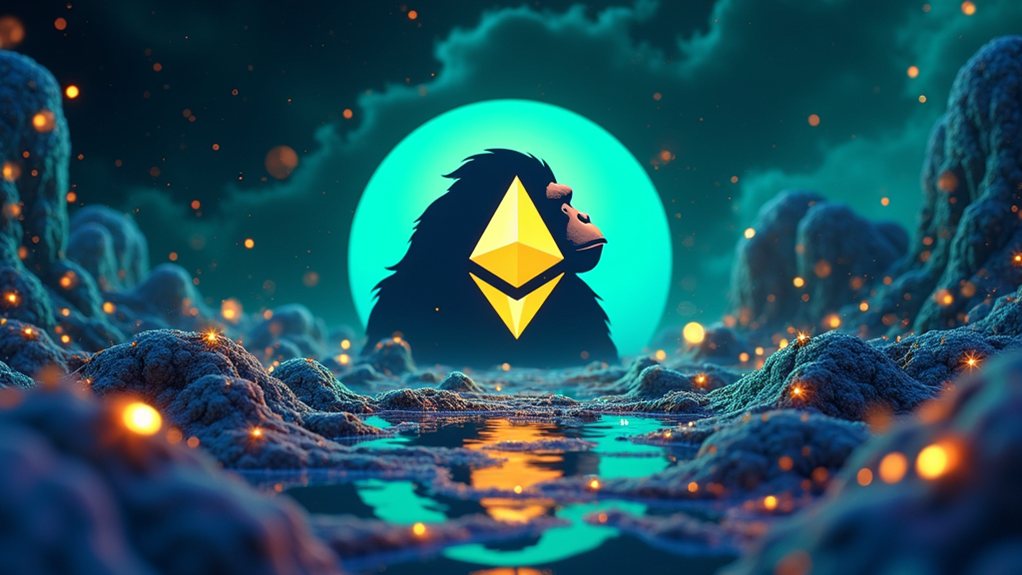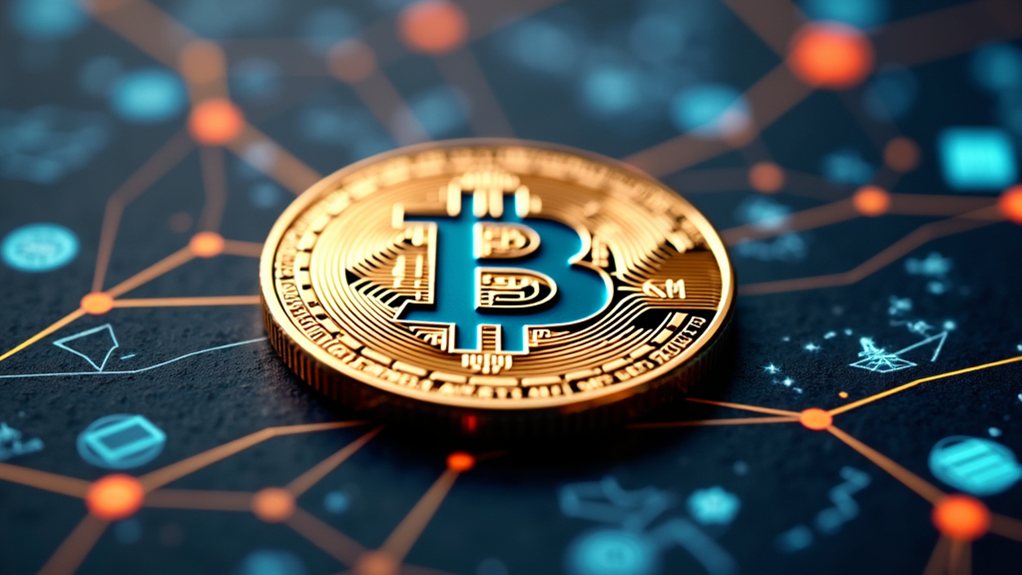ApeCoin is a cryptocurrency token launched in March 2022. It's tied to the Bored Ape Yacht Club NFT collection created by Yuga Labs. APE functions as both a governance token, giving holders voting rights in the ApeCoin DAO, and a utility token for payments in the ecosystem. It has a fixed supply of 1 billion tokens and works on the Ethereum blockchain. The token's growing ecosystem continues to expand beyond digital art.

At the intersection of cryptocurrency and digital art, ApeCoin stands as a significant player in the blockchain world. Launched in March 2022, this ERC-20 token serves as both a governance and utility token for the broader APE ecosystem. It's closely affiliated with the popular Bored Ape Yacht Club (BAYC) NFT collection and was created by Yuga Labs, the company behind these digital collectibles. Similar to how NFT art collecting has transformed the traditional art market, ApeCoin represents a new frontier in the ownership and monetization of digital assets.
ApeCoin has a fixed supply of 1 billion tokens, making it a finite resource in the cryptocurrency landscape. Currently, about 752 million APE tokens are in circulation. The distribution of these tokens follows a specific allocation: 62% to the ecosystem fund, 16% to Yuga Labs and charity, 14% to launch contributors, and 8% to the founders of Yuga Labs and BAYC.
The token gives holders voting power in the ApeCoin DAO (Decentralized Autonomous Organization), where community members can propose and vote on decisions affecting the ecosystem. The token's intellectual property rights are collectively managed by ApeCoin DAO members. The APE Foundation implements these decisions and is overseen by a five-member board. These board members are elected annually by APE token holders, ensuring the community has a say in the leadership.
Users can do more with ApeCoin than just vote. The token serves as currency in blockchain games, provides access to exclusive events and merchandise, and works as a payment method in Yuga Labs' Otherside metaverse. The recently launched ApeChain ecosystem enables faster transactions with lower fees compared to the Ethereum mainnet. It's also being integrated with various third-party projects and applications, expanding its utility beyond the immediate ecosystem.
From a technical standpoint, ApeCoin operates on the Ethereum blockchain as an ERC-20 token. This makes it compatible with numerous decentralized applications and interoperable with other tokens sharing the same standard. It supports smart contract functionality but doesn't have mining or burning mechanisms.
ApeCoin's market journey has been volatile. It reached an all-time high of $39.40 shortly after its launch in March 2022 but has since experienced significant price fluctuations, dropping to as low as $0.42 in March 2025. Currently, its market capitalization stands at approximately $400 million. Despite these fluctuations, the token maintains high trading volume and liquidity across major cryptocurrency exchanges.
Looking forward, ApeCoin is set to play a key role in Yuga Labs' Otherside metaverse project. Plans also include expanding the APE ecosystem through new partnerships, increasing adoption in gaming and NFT spaces, and developing ApeChain to improve scalability.
The project's focus remains on Web3 growth and supporting decentralized applications, positioning ApeCoin as a continued presence in the evolving digital asset landscape.
Frequently Asked Questions
How Can I Stake My Apecoin for Rewards?
Staking ApeCoin involves several steps.
Users first choose a platform like ApeStake.io or exchanges like Binance. They then connect a compatible wallet, such as MetaMask, with enough APE and ETH for fees.
Next, they select from four staking pools, including the APE-only option that doesn't require NFT ownership.
Stakers can monitor rewards through their chosen platform's dashboard and claim earnings periodically.
Is Apecoin Limited to the Bored Ape Ecosystem?
ApeCoin isn't limited to just the Bored Ape ecosystem. While created by Yuga Labs, it's designed for broader utility.
It's used in various Web3 applications, play-to-earn games like Benji Bananas, and as payment for TIME Magazine's digital subscriptions.
The token also functions in DeFi protocols as collateral and is integrated into the Otherside metaverse.
Its ecosystem continues to expand through partnerships with external developers and projects.
Who Are the Founding Members of Apecoin DAO?
The ApeCoin DAO's initial board members included Reddit co-founder Alexis Ohanian, FTX's Amy Wu, Sound Ventures' Maaria Bajwa, Animoca Brands' Yat Siu, and Horizen Labs' Dean Steinbeck.
This founding group served a 6-month term before the community elected new representatives.
Today's board now includes both original members (Ohanian and Siu) alongside three community-elected members: Gerry, Veratheape, and Boredapeag.
Can Apecoin's Governance Model Change Over Time?
Yes, ApeCoin's governance model can change over time.
The system allows for evolution through ApeCoin Improvement Proposals (AIPs), which token holders vote on. Changes might include moving to fully on-chain voting, implementing delegation systems, or creating specialized committees.
Factors like community participation, technological advancements, regulatory requirements, and ecosystem growth will influence these changes.
The ApeCoin community has built-in mechanisms to adapt governance as needed.
What Security Audits Has Apecoin's Smart Contract Undergone?
ApeCoin's smart contract has undergone multiple security audits from reputable firms. CertiK found one major issue and two informational concerns, with no critical vulnerabilities detected.
Other auditors included Verilog Solutions, EtherAuthority, and Coinsult. The contracts were deemed "Secured" despite some centralization risks.
BendDAO's ApeCoin vault was also assessed. The project maintains ongoing security through regular audits, bug bounties, and real-time monitoring.














